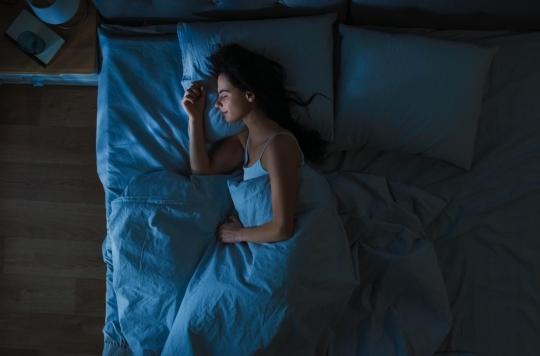According to a study published in the European Heart Journal, people who fall asleep between 10 and 11 p.m. have a lower risk of developing heart disease.

- Going to bed after midnight would increase the cardiovascular risk by 25%, going to bed before 10 p.m. by 24%.
- In question, according to the researchers: a misalignment with the circadian rhythm. Also called biological clock, it works on 24 hours and depends mainly on exposure to sunlight.
Going to bed too late is not good for your health, but neither is going to bed too early!
This is the conclusion reached by researchers at the University of Exeter, UK. In a study published in the European Heart Journal – Digital Healththey establish that falling asleep before 10 p.m. and after 11 p.m. increases the risk of cardiovascular disease by up to 25%.
The reason, they say: a misalignment with the internal biological clock, which operates on a 24-hour rhythm. “While we cannot conclude a causal relationship from our study, the results suggest that early or late bedtimes may be more likely to disrupt the biological clock, with adverse consequences for cardiovascular health”says Dr David Plans of the University of Exeter and lead author.
Going to bed after midnight is the most detrimental
The study involved 88,026 people aged 43 to 79 from the UK Biobank, recruited between 2006 and 2010. 58% were female and the average age was 61. The researchers collected data on the onset of sleep and the time of awakening over 7 days and the participants completed various questionnaires relating to their lifestyle, their health and their physical condition. They were then followed for a new diagnosis of cardiovascular disease, defined as heart attack, heart failure, chronic ischemic heart disease, stroke and transient ischemic attack.
During an average follow-up of 5.7 years, 3172 participants (3.6%) developed cardiovascular disease. All these data were then adjusted according to different criteria: age, sex, duration and irregularity of sleep, smoking, BMI or diseases.
The results showed that, compared to falling asleep between 10:00 p.m. and 10:59 p.m., people falling asleep at midnight or later had a 25% higher risk of cardiovascular disease. Those who went to bed between 11 p.m. and 11:59 p.m. had a 12% higher risk and those who went to bed before 10 p.m. had a 24% higher risk. The association with an increased cardiovascular risk was stronger in women and only falling asleep before 10 p.m. remained significant in men.
Choosing your sleep time to reduce the risk of heart disease
For Dr. Plans, these results indicate that “The optimal time to fall asleep is at a specific time in the body’s 24-hour cycle and any deviation can be detrimental to health. The riskiest time was after midnight, potentially because it can reduce the probability of seeing morning light, which resets the biological clock.”
“Although the results do not demonstrate causation, sleep timing emerged as a potential cardiac risk factor – independent of other risk factors and sleep characteristics. If our findings are confirmed by further studies, timing health and basic sleep hygiene could be an inexpensive public health target to reduce the risk of heart disease.”he concludes.
.















